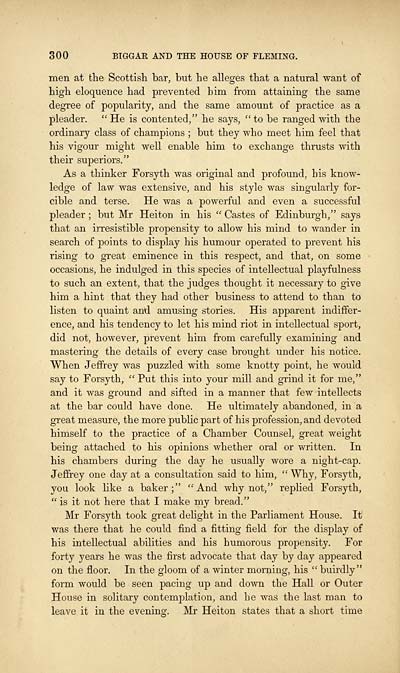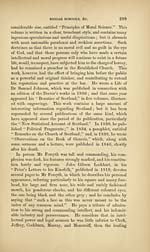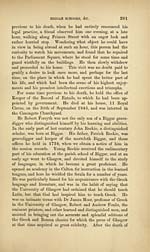Biggar and the House of Fleming
(330) Page 312
Download files
Complete book:
Individual page:
Thumbnail gallery: Grid view | List view

300 BIGGAK, AND THE HOUSE OF FLEMING.
men at the Scottish bar, but he alleges that a natural want of
high eloquence had prevented bim from attaining the same
degree of popularity, and the same amount of practice as a
pleader. " He is contented," he says, " to be ranged with the
ordinary class of champions ; but they who meet him feel that
his vigour might well enable him to exchange thrusts with
their superiors."
As a thinker Forsyth was original and profound, his know-
ledge of law was extensive, and his style was singularly for-
cible and terse. He was a powerful and even a successful
pleader ; but Mr Heiton in his " Castes of Edinburgh," says
that an irresistible propensity to allow his mind to wander in
search of points to display his humour operated to prevent his
rising to great eminence in this respect, and that, on some
occasions, he indulged in this species of intellectual playfulness
to such an extent, that the judges thought it necessary to give
him a hint that they had other business to attend to than to
listen to quaint and amusing stories. His apparent indiffer-
ence, and his tendency to let his mind riot in intellectual sport,
did not, however, prevent him from carefully examining and
mastering the details of every case brought under his notice.
When Jeffrey was puzzled with some knotty point, he would
say to Forsyth, " Put this into your mill and grind it for me,"
and it was ground and sifted in a manner that few intellects
at the bar could have done. He ultimately abandoned, in a
great measure, the more public part of his profession, and devoted
himself to the practice of a Chamber Counsel, great weight
being attached to his opinions whether oral or written. In
his chambers during the day he usually wore a night-cap.
Jeffrey one day at a consultation said to him, " Why, Forsyth,
you look like a baker;" "And why not," replied Forsyth,
" is it not here that I make my bread."
Mr Forsyth took great delight in the Parliament House. It
was there that he could find a fitting field for the display of
his intellectual abilities and his humorous propensity. For
forty years he was the first advocate that day by day appeared
on the floor. In the gloom of a winter morning, his " buirdly"
form would be seen pacing up and down the Hall or Outer
House in solitary contemplation, and he was the last man to
leave it in the evening. Mr Heiton states that a short time
men at the Scottish bar, but he alleges that a natural want of
high eloquence had prevented bim from attaining the same
degree of popularity, and the same amount of practice as a
pleader. " He is contented," he says, " to be ranged with the
ordinary class of champions ; but they who meet him feel that
his vigour might well enable him to exchange thrusts with
their superiors."
As a thinker Forsyth was original and profound, his know-
ledge of law was extensive, and his style was singularly for-
cible and terse. He was a powerful and even a successful
pleader ; but Mr Heiton in his " Castes of Edinburgh," says
that an irresistible propensity to allow his mind to wander in
search of points to display his humour operated to prevent his
rising to great eminence in this respect, and that, on some
occasions, he indulged in this species of intellectual playfulness
to such an extent, that the judges thought it necessary to give
him a hint that they had other business to attend to than to
listen to quaint and amusing stories. His apparent indiffer-
ence, and his tendency to let his mind riot in intellectual sport,
did not, however, prevent him from carefully examining and
mastering the details of every case brought under his notice.
When Jeffrey was puzzled with some knotty point, he would
say to Forsyth, " Put this into your mill and grind it for me,"
and it was ground and sifted in a manner that few intellects
at the bar could have done. He ultimately abandoned, in a
great measure, the more public part of his profession, and devoted
himself to the practice of a Chamber Counsel, great weight
being attached to his opinions whether oral or written. In
his chambers during the day he usually wore a night-cap.
Jeffrey one day at a consultation said to him, " Why, Forsyth,
you look like a baker;" "And why not," replied Forsyth,
" is it not here that I make my bread."
Mr Forsyth took great delight in the Parliament House. It
was there that he could find a fitting field for the display of
his intellectual abilities and his humorous propensity. For
forty years he was the first advocate that day by day appeared
on the floor. In the gloom of a winter morning, his " buirdly"
form would be seen pacing up and down the Hall or Outer
House in solitary contemplation, and he was the last man to
leave it in the evening. Mr Heiton states that a short time
Set display mode to:
![]() Universal Viewer |
Universal Viewer | ![]() Mirador |
Large image | Transcription
Mirador |
Large image | Transcription
Images and transcriptions on this page, including medium image downloads, may be used under the Creative Commons Attribution 4.0 International Licence unless otherwise stated. ![]()
| Histories of Scottish families > Biggar and the House of Fleming > (330) Page 312 |
|---|
| Permanent URL | https://digital.nls.uk/94843242 |
|---|
| Description | A selection of almost 400 printed items relating to the history of Scottish families, mostly dating from the 19th and early 20th centuries. Includes memoirs, genealogies and clan histories, with a few produced by emigrant families. The earliest family history goes back to AD 916. |
|---|

